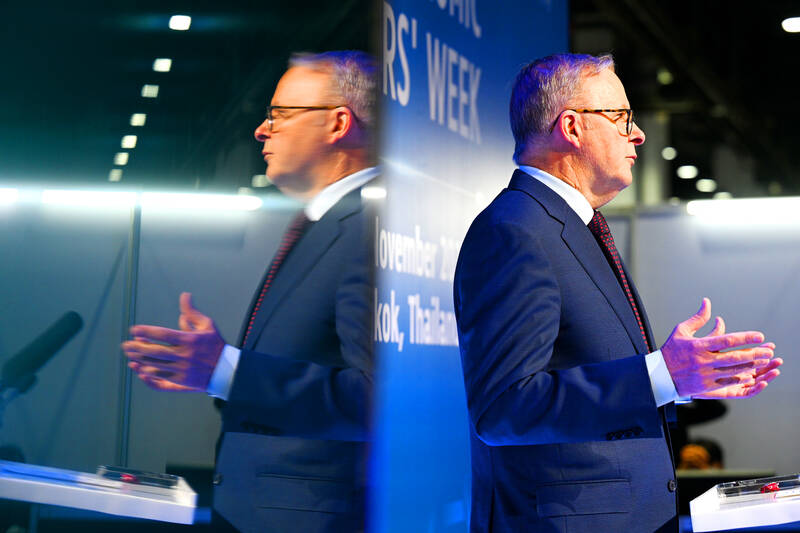Minister of Foreign Affairs Joseph Wu (吳釗燮) yesterday said that no member of the Comprehensive and Progressive Agreement for Trans-Pacific Partnership (CPTPP) has expressed opposition to Taiwan applying to join the trade bloc.
“So far, we have not met any one country [that is a CPTPP member] that has openly or privately expressed their objection to Taiwan’s bid,” Wu told lawmakers at a meeting of the legislature’s Foreign Affairs and National Defense Committee.
The government had been in talks with all 11 CPTPP members about Taiwan’s possible membership, Wu said.

Photo: EPA-EFE
Asked on Friday if Australia supported Taiwan joining the bloc, Australian Prime Minister Anthony Albanese said that the CPTPP was “a relationship between nation states that are recognized.”
Speaking at the APEC summit in Bangkok, Albanese described Taiwan as an “economy,” inferred by some to mean that Taiwan did not qualify to join the CPTPP.
The Ministry of Foreign Affairs said that this interpretation is at odds with the CPTPP’s charter, which states that “any State or separate customs territory may accede to this Agreement.”
On Saturday, Albanese offered a slightly modified response, stating that applications would be “dealt with on consensus for economies applying to join the CPTPP” and judged based on their individual merits.
At yesterday’s legislative meeting, Wu said the Australian government had made it clear to Taipei that it welcomed “all economic entities” that meet the CPTPP’s high standards to join the bloc.
Wu said that following Albanese comments on Friday, the ministry had reached out to an “authoritative Australian government branch,” which made the clarification.
The ministry did not reveal the source of the clarification, and the Australian government has not issued a statement to that effect.
The CPTPP — which grew out of the Trans-Pacific Partnership abandoned by the US in January 2017 — is one of the world’s biggest trade blocs, representing a market of 500 million people and accounting for 13.5 percent of global trade.
For a new member to join the CPTPP, all 11 signatories — Australia, Brunei, Canada, Chile, Japan, Malaysia, Mexico, New Zealand, Peru, Singapore and Vietnam — must approve the application.
Taiwan applied on Sept. 22 last year to join the CPTPP, less than one week after China submitted its application.
Asked when Taiwan might join the trade bloc, Wu told lawmakers that the CPTPP is focusing on reviewing the UK’s bid and is unlikely to deal with Taiwan’s application any time soon.

An essay competition jointly organized by a local writing society and a publisher affiliated with the Chinese Communist Party (CCP) might have contravened the Act Governing Relations Between the People of the Taiwan Area and the Mainland Area (臺灣地區與大陸地區人民關係條例), the Mainland Affairs Council (MAC) said on Thursday. “In this case, the partner organization is clearly an agency under the CCP’s Fujian Provincial Committee,” MAC Deputy Minister and spokesperson Liang Wen-chieh (梁文傑) said at a news briefing in Taipei. “It also involves bringing Taiwanese students to China with all-expenses-paid arrangements to attend award ceremonies and camps,” Liang said. Those two “characteristics” are typically sufficient

A magnitude 5.9 earthquake that struck about 33km off the coast of Hualien City was the "main shock" in a series of quakes in the area, with aftershocks expected over the next three days, the Central Weather Administration (CWA) said yesterday. Prior to the magnitude 5.9 quake shaking most of Taiwan at 6:53pm yesterday, six other earthquakes stronger than a magnitude of 4, starting with a magnitude 5.5 quake at 6:09pm, occurred in the area. CWA Seismological Center Director Wu Chien-fu (吳健富) confirmed that the quakes were all part of the same series and that the magnitude 5.5 temblor was

The brilliant blue waters, thick foliage and bucolic atmosphere on this seemingly idyllic archipelago deep in the Pacific Ocean belie the key role it now plays in a titanic geopolitical struggle. Palau is again on the front line as China, and the US and its allies prepare their forces in an intensifying contest for control over the Asia-Pacific region. The democratic nation of just 17,000 people hosts US-controlled airstrips and soon-to-be-completed radar installations that the US military describes as “critical” to monitoring vast swathes of water and airspace. It is also a key piece of the second island chain, a string of

The Central Weather Administration has issued a heat alert for southeastern Taiwan, warning of temperatures as high as 36°C today, while alerting some coastal areas of strong winds later in the day. Kaohsiung’s Neimen District (內門) and Pingtung County’s Neipu Township (內埔) are under an orange heat alert, which warns of temperatures as high as 36°C for three consecutive days, the CWA said, citing southwest winds. The heat would also extend to Tainan’s Nansi (楠西) and Yujing (玉井) districts, as well as Pingtung’s Gaoshu (高樹), Yanpu (鹽埔) and Majia (瑪家) townships, it said, forecasting highs of up to 36°C in those areas